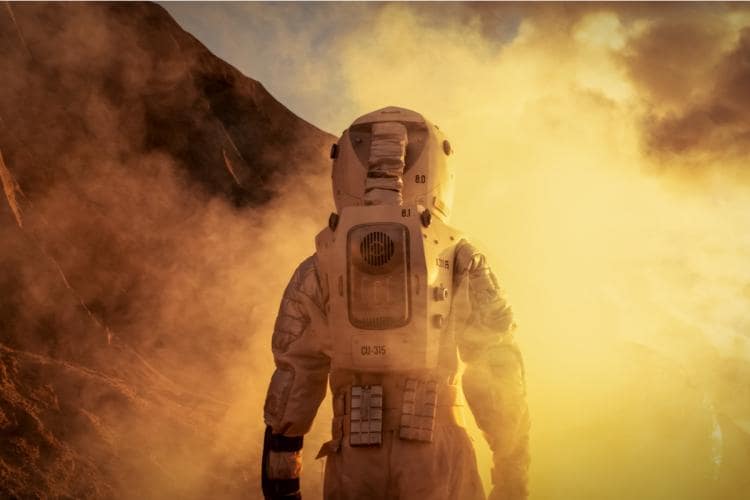Top Five Reasons to Avoid Space Travel
The lack of gravitational force is deadly to humans. The list of bodily systems that don’t work properly grows with every examination of astronauts who spend prolonged time in space.

1. Gravity
- The lack of gravitational force is deadly to humans. The list of bodily systems that don’t work properly grows with every examination of astronauts who spend prolonged time in space. Starting at the top, the cerebrospinal fluid does not circulate properly in low gravity states, causing brain swelling and cerebral motor dysfunction. While loss of balance may be obvious, all types of proprioception are affected—some perhaps permanently. Changes in the brains of astronauts noted by MRI suggest premature aging—and the trips so far have been relatively short.
- Normally, our body’s fluids are pulled down by gravity, and our systems adjust. In low gravity, the fluids redistribute. Faces, eyes, and brains all swell, overloading the cardiovascular system. Cardiac atrophy, with weakening heart muscle activity, will eventually disable all humans in space.
- Bone formation depends on resistance exercises. The loss of bone mineral essentially ages astronauts by decades and makes fragility fractures a huge risk. Bone loss accelerates from 3% cortical loss per year to 1% per month. Most astronauts take up to three years to recover from a simple 4-month visit in space. It simply is not possible to exercise enough while in space. The osteoclasts cells that break bone down are ramped up more than the bone-forming cells, leading to an overload of calcium in the system.
- Long-haul astronauts experience a decreased production of red blood cells.
- The proprioception system that relies on the senses. The inner ear and blood pressure are so disturbed that all astronauts develop nausea for varying periods of time. A single episode of vomiting in a space suit can be fatal.
2. Radiation
- Radiation exposure is 10 times higher in low orbit than it is on land. As insulating lead is too heavy for spacecraft, astronauts receive toxic doses of radiation every second. The damage to the retina, the thyroid, and the brain, along with the body’s most sensitive tissues, is permanent. Any residence in space would require massive shielding of housing and mobile units, along with clothing—making Mars or lunar colonists relatively stationary. Unanticipated solar flares produce fatal radiation doses in minutes, even through the walls of spacecraft. In one measured solar storm, the surface level of radiation on the planet Mars doubled.
- No fetus could ever be conceived in this low-gravity and high-radiation environment. Most likely, they would be stillborn, due to the 9-month exposure to radiation in the womb, and/or deformed upon delivery.
- The eyes are particularly sensitive, and a higher incidence of radiation-induced cataracts in astronauts has been noted.
- Alzheimer’s and other degenerative brain diseases are accelerated in the astronauts who have traveled into space so far.
- Weakening of the immune system. Chromosomal changes in lymphocytes have been noted, and T-Cell function required for the immune system is reduced.
3. Depression
- Fresh air is not only key to physical health, it’s also critical for mental health. People who are confined indoors with no exposure to fresh air (e.g., prisoners) display depression and multiple other health issues. While indoor gardens may provide the simulated scent and humidity of outdoor nature, they are a poor substitute for the real thing. The sense of taste is reduced, and foods do not taste the same. Smells freed from gravity permeate the shared living space, diminishing the quality of life. Combined with claustrophobia, lack of biodiversity, lack of privacy, no family, and reduced opportunities for social, romantic, or sexual engagement, extended time in space is a prescription for mental disease.
- The spacefarers’ complete reliance on a complex maze of critical engineering and life-support equipment, all supplied by the lowest bidder (if from public sources) or by private contractors with varying experience and little accountability. There is a no-return policy once in space, even for Amazon Prime.
- Aside from personal depression, there are other mental health dangers—such as the lack of a police force with the ability to resist one man gone mad. Even if you could imprison someone for a crime in space, how could the colony spare the resources for even one unproductive member? There will be no provisions to support the mentally ill, the sick, or the incarcerated.
4. Infection
- Microbes and viruses become more virulent in space, possibly leading to food poisoning, antibiotic resistance, and hard-to-treat infections. A likely confluence of microbiomes—interacting without medical services, a hospital environment or advanced testing facilities to control and treat infectious agents—risks complete colony wipeout from a single antibiotic-resistant organism.
5. Healthcare
- The high likelihood of cancer formation from radiation, blood pressure elevations from lack of gravity, and the stress of living in confined quarters will all lead to complex health challenges in an environment where only basic emergency care is available. Astronaut crews will not have the range of medical experts, CT, MRI, or other tools necessary for accurate diagnoses. Nor will they have the surgical facilities for critical health care. The expected lifespan of extraterrestrial inhabitants will be shockingly short.
Even if a small colony could survive, they could not innovate, manufacture, or farm at scale. We can do that here on Earth because we spend relatively little energy surviving in our atmosphere, though clearly due to the climate damage our living efficiency produced we should have spent more.
My wish for all is: look around, invest in the Earth, and save this planet while we can.
Dive Deeper into this Topic with the "Future of Space Podcast" featuring Dr. Stone
Tune in for a fascinating podcast with Dr. Stone on space’s harsh realities and its impact on human health. This thought-provoking conversation delves deep into the exciting intersection of medicine and space travel, offering imaginative insights into what our future may hold.
